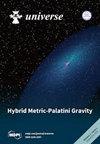用超选规则重温林德勒时空中的量子场论
IF 2.5
4区 物理与天体物理
Q2 ASTRONOMY & ASTROPHYSICS
引用次数: 0
摘要
林德勒时空中的量子场论(QFT)是理解弯曲时空中的单位性和信息丢失悖论的一个途径。林德勒坐标将明考斯基时空映射到具有水平线的区域,有效地将加速观察者划分为因果关系断开的扇区。利用标准量子场论技术和闵科夫斯基坐标与林德勒坐标之间的波哥留布夫变换,可以在这些因果分离的时空区域之间产生状态纠缠。这导致了单元性的破坏,意味着在林德勒视界之外,纠缠对象的信息可能会不可逆转地丢失。因此,就会出现纯态演变为混合态的情况。在本文中,我们利用最近提出的直接相加量子场论(DQFT)公式,介绍了一种理解这种现象的新框架,它以明考斯基时空的奇偶性和时间反转(PT)对称性制定的超选择规则为基础。在将 DQFT 应用于林德勒时空的背景下,我们证明了每个林德勒观测者原则上都能进入视界内的纯态,从而恢复了统一性。然而,我们的分析也揭示了乌鲁辐射热谱的出现。这促使我们重新评估林德勒时空中的纠缠,我们提出了一个新的视角,即林德勒观测者如何在视界之外重建互补信息。此外,我们还在 DQFT 框架内重新审视了里赫-施莱德尔定理的含义。最后,我们强调了我们的发现如何有助于当前在德西特和黑洞时空中旨在阐明量子场论中单元性作用的努力。本文章由计算机程序翻译,如有差异,请以英文原文为准。
Revisiting Quantum Field Theory in Rindler Spacetime with Superselection Rules
Quantum field theory (QFT) in Rindler spacetime is a gateway to understanding unitarity and information loss paradoxes in curved spacetime. Rindler coordinates map Minkowski spacetime onto regions with horizons, effectively dividing accelerated observers into causally disconnected sectors. Employing standard quantum field theory techniques and Bogoliubov transformations between Minkowski and Rindler coordinates yields entanglement between states across these causally separated regions of spacetime. This results in a breakdown of unitarity, implying that information regarding the entangled partner may be irretrievably lost beyond the Rindler horizon. As a consequence, one has a situation of pure states evolving into mixed states. In this paper, we introduce a novel framework for comprehending this phenomenon using a recently proposed formulation of direct-sum quantum field theory (DQFT), which is grounded in superselection rules formulated by the parity and time reversal (PT) symmetry of Minkowski spacetime. In the context of DQFT applied to Rindler spacetime, we demonstrate that each Rindler observer can, in principle, access pure states within the horizon, thereby restoring unitarity. However, our analysis also reveals the emergence of a thermal spectrum of Unruh radiation. This prompts a reevaluation of entanglement in Rindler spacetime, where we propose a novel perspective on how Rindler observers may reconstruct complementary information beyond the horizon. Furthermore, we revisit the implications of the Reeh-Schlieder theorem within the framework of DQFT. Lastly, we underscore how our findings contribute to ongoing efforts aimed at elucidating the role of unitarity in quantum field theory within the context of de Sitter and black hole spacetimes.
求助全文
通过发布文献求助,成功后即可免费获取论文全文。
去求助
来源期刊

Universe
Physics and Astronomy-General Physics and Astronomy
CiteScore
4.30
自引率
17.20%
发文量
562
审稿时长
24.38 days
期刊介绍:
Universe (ISSN 2218-1997) is an international peer-reviewed open access journal focused on fundamental principles in physics. It publishes reviews, research papers, communications, conference reports and short notes. Our aim is to encourage scientists to publish their research results in as much detail as possible. There is no restriction on the length of the papers.
 求助内容:
求助内容: 应助结果提醒方式:
应助结果提醒方式:


